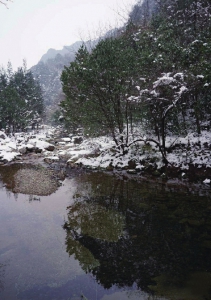
Yang Shihua, a 67-year-old farmer in Hanshuiyuan village, quite enjoys his walks on a newly built sightseeing footpath. "Now all the folks and I know that we need to protect the source of water. Nobody will throw any garbage," he says with a smile while looking at the river.
The village in Ningqiang county of Shaanxi province is located at the source of Hanjiang River, the largest tributary of Yangtze River. Hanjiang River, which is more than 1,500 kilometers long, originates from here and goes all the way east through the mountains between Shaanxi and Hubei provinces, eventually reaching the Danjiangkou Reservoir. From there, water is diverted to Beijing and Tianjin through the central route of the South-to-North Water Diversion Project.
Ningqiang county and its neighboring areas in southern Shaanxi have now become an important water conservation area of the South-to-North Water Diversion Project.
"We will definitely protect the water source of Hanjiang River," said Wang Guangjun, Party secretary of Hanshuiyuan village. "It's because of the clean water that our lives are getting better."
Yang Shihua moved into Hanshuiyuan village more than 10 years ago. Impressed by clean water there, he started a fish-farming business. Today, Yang says he still has a fresh memory of poverty in Hanshuiyuan village in the past. "Houses were all made of mud, there was not even a decent road, and the soil was barren. In the summer, falling rocks and mudslides often peeled off the soil and just took away our harvest."
To make a better living, villagers began to raise pigs and cattle and started planting mushrooms. As a result, they had cut down a great number of trees, which led to a sharp decrease of ground water. Besides, livestock droppings were often discharged directly into the water.
The local government realized that things had to change before it was too late. Started in 2010, the authorities prohibited cutting down trees, shut down livestock farms, rebuilt toilets, and forbade direct discharge of sewage. Local villagers were also required to sign agreements, promising that they would maintain sanitation.
At first the villagers were upset, since giving up their business in livestock farming or mushroom planting could mean losing up to 50,000 yuan (US$7,481) every year. However, it did not take long before villagers noticed that the forest on the mountain was getting dense, the village saw more water flow, and the river here was becoming clearer. On holidays, many tourists from Beijing, Tianjin and Wuhan drove here for vacation.
Hanshuiyuan villagers thus embarked on a new development path. In 2014, the village transferred 2,100 mu of land (140 hectares) and brought in two enterprises to develop tea and Chinese herbal plantations. Villagers received land transfer fees every year, and they also found jobs in the factories. Many started to plant bletilla, gastrodia, ginkgo, as well as tea trees. And more than 110 families began to raise bees. In 2018, the per capita income in Hanshuiyuan village was 7,632 yuan, nearly double that of 2014.
"A new road from the village to the county will be opened before the May Day this year, and more tourists will come," said Chen Yipin, Party secretary of the Hanyuan Sub-district Office, adding that today's Hanshuiyuan village enjoys beautiful scenery in all seasons. The local government also plans to support villagers in turning their homes into guesthouses and developing rural tourism.